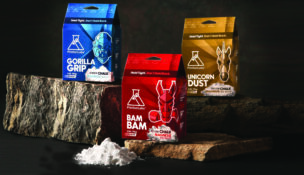Colorado microbrews: Yes, they "can" – faster than ever
Wild Goose's new system has been a game-changer
Pamela Sichel //November 13, 2015//


Colorado microbrews: Yes, they "can" – faster than ever
Wild Goose's new system has been a game-changer
Pamela Sichel //November 13, 2015//
The American craft and microbrew industry is growing at the astonishing rate of 18 percent a year, according to the Brewer’s Association. Until a few years ago, microbreweries were limited to regional product distribution, due to the prohibitive cost of shipping bottled beer. Cans were the answer, but small-scale canning technology was slow and expensive.
Then, Boulder engineer Jeff Aldred and his partner, Alexis Foreman, inadvertently changed the microbrew game in 2007. Aldred and Foreman had recently opened Wild Goose Engineering, a 1,000-square-foot, four-man machine shop dedicated to prototype fabrication for local manufacturers.
The partners befriended their neighbor, the fledgling Upslope Brewery. Hindered by its canning system, Upslope asked Aldred and Foreman to evaluate its equipment. “The system we were using was too slow,” says Upslope founder Dany Pages. “Speed is everything in the brewing business.”
“They were having endless problems with their system, and were not happy with the customer service they were receiving,” Foreman says. The partners re-engineered Upslope’s system to produce 20 cans per minute vs. the previous five, allowing Upslope to can a brew batch in 10 hours rather than the 24 it formerly took – a game-changer in microbrew production. Pages urged Aldred and Foreman to take their system to market.
Following the equipment redesign, Aldred developed patent-pending technology for an affordable, modular canning system that met the needs of microbreweries ranging from mom-and-pop operations to large-scale producers. Because of the fraternal, non-competitive nature of the industry, word spread and Wild Goose was soon backlogged with orders.
With virtually no marketing effort, Wild Goose has grown from four employees to 44. After seven moves, the manufacturing facility now occupies 21,000 square feet, but is outgrowing its current site.
The technology evolved, and Wild Goose’s fastest system now produces up to 100 cans per minute. Faster canning equals more revenue. With a Wild Goose system, small, regional brewers can springboard into the national artisan, craft brew market.
“Mobile canning has given small craft breweries an opportunity they didn’t have in the past. I don’t think Wild Goose and other manufacturers anticipated the industry impact they would have,” says Andy Sparhawk, Craft Beer/Brewer’s Association program coordinator.
Wild Goose equipment is in use in the U.S. and Canada, the U.K. and Argentina, with pending orders from breweries in Belgium and France. When a system is ready for shipment, regardless of destination, Wild Goose sends an installation and training team to ensure clients quickly become operationally competent. By the time the Wild Goose team leaves, roughly three days later, a system is in full production mode.
Aside from a handful of standard parts, the systems are fabricated and manufactured in Boulder.
Aldred says U.S. manufacturing is an overlooked key to economic recovery. “I believe American manufacturing is alive and well. We can and will make some of the highest quality goods in the world,” he says. “The multinationals cannot overcome this.”
The mobile system is also being used for wine, tea, and other “artisan” crafted beverages. Last year brought $6.7 million in sales, and the company projects $12 million in 2015. Model prices range from $30,000 to $150,000. The fastest canner produces up to 100 cans per minute. To date, Wild Goose has sold more than 250 systems and has a backlog of 33 units with a delivery time of 20 weeks.
Wild Goose’s immediate goal and challenge is to meet product demand as quickly as possible. “We are looking forward to steadily increasing our business here at home and finding additional customers throughout the rest of the world,” Aldred says. cb
Craft brew industry stats
Craft brewers provide an estimated 360,000 jobs in the U.S., including serving staff in brewpubs.
Growth of the craft brewing industry in 2014 was 18 percent by volume and 22 percent in dollars.
Retail dollar value from craft brewers in 2014 was estimated at $19.6 billion, up from $14.3 billion in 2013.
Craft breweries have now averaged 10.9 percent growth over the last decade.
Craft breweries make up 98 percent of all U.S. operating breweries.
In 2013, the U.S. saw a record 3,699 active “permitted breweries” with 217 in Colorado.
Sources: The Beer Institute, Craftbeer/Brewer Association


























